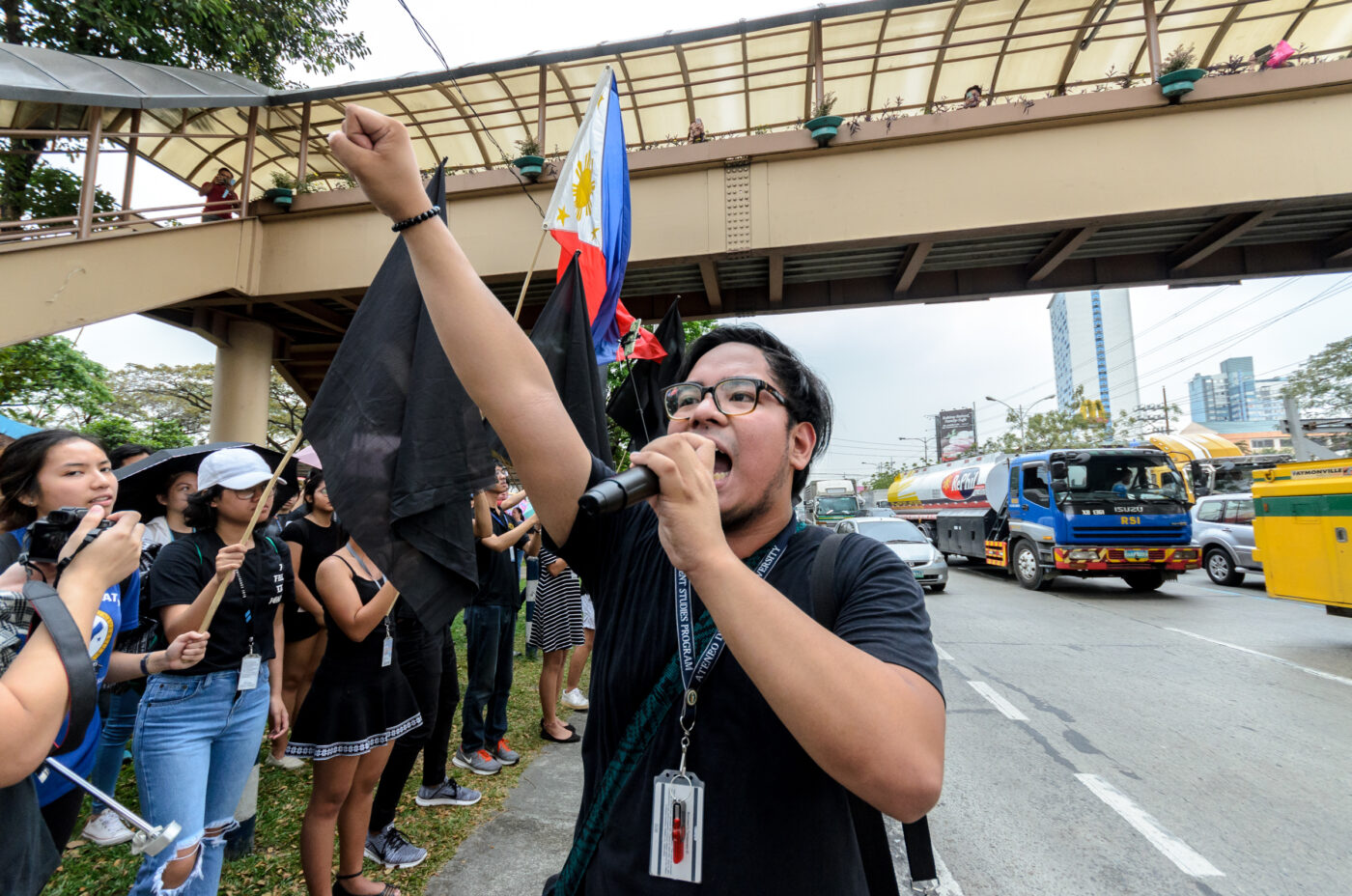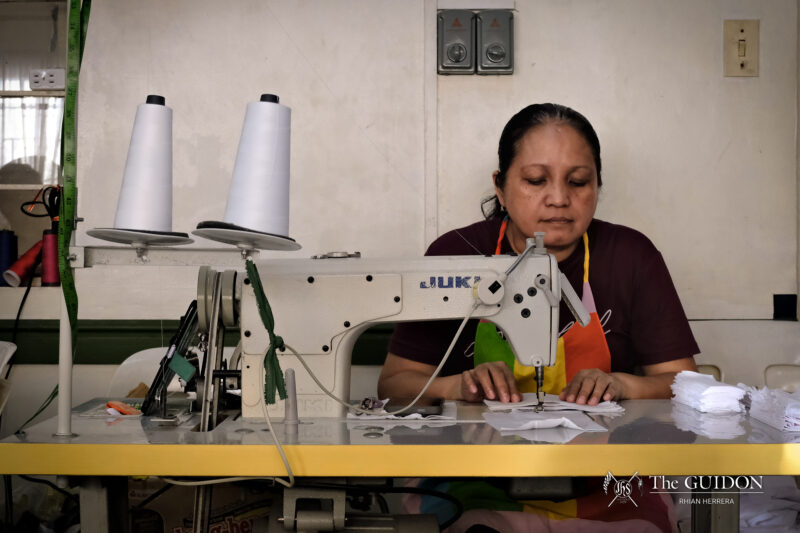“HINDI PARUSANG kamatayan ang solusyon upang lunasin ang sakit ng krimen sa Pilipinas. (The death penalty is not the solution to the problem of crime in the Philippines).”
This was the sentiment expressed by members of the Ateneo community as the Sanggunian Task Force SIKHAY and the Council of Organizations of the Ateneo (COA) led a prayer vigil along Katipunan Avenue during the opening of the House of Representatives (HoR) plenary debates on death penalty on January 31.
On the same day, an Ateneo student contingent attended the plenary at the HoR with iDEFEND (In Defense of Human Rights and Dignity Movement) and various human rights groups opposing the restoration of death penalty.
Sanggunian Finance Chair Hya Bendaña, one of the Ateneans who went to the HoR, said that although it seemed like the student contingent and human rights groups just “listened” to the plenary, their presence is already valuable.
“Attending plenaries, lobbying for human rights, and spreading awareness on the value of human life are just few of the many ways we can counter a culture and a political system that slowly accepts death penalty,” she said. “[The congressmen] are pressured to become more transparent because there are witnesses to the hearings.”
As of press time, House Speaker Pantaleon Alvarez is seeking to finish the plenary debates and amendments on the bill by March 8. Capital punishment was abolished in 2006 under the administration of former President and now Pampanga Representative Gloria Macapagal-Arroyo.
Lobbying efforts
SIKHAY Coordinator Luis Enriquez said that Ateneans’ opposition against the restoration of death penalty can be traced to the Jesuit tradition of cura personalis (care for the entire person).
“That experience of cura personalis translates also to how we deal with children in conflict with the law and also with people who transgressed the law. While of course there is a need to serve justice, it is part of our Jesuit tradition not to subject them to violent measures when much better alternatives exist,” he said.
Assessing the efforts of SIKHAY in mobilizing the student body, Enriquez admitted that there is still room for improvement.
“I think it is important to note this early that the task force is not an entity in itself. Our job is really to coordinate the student body to work on issues where they find the need to respond. We take from the students who express their opposition against the death penalty measure,” he said. “I have repeatedly reached out to the members of the Sanggunian and COA [about how the] challenge really is to meet the students where they are. I have asked multiple times for them to … make good connections with their constituents.”
According to Enriquez, the statements of Alvarez show that the lobbying for the restoration of death penalty is turning out to be “tyrannical.” However, he sees a “glimmer of hope” that it won’t pass through the Senate.
“Hopefully, we’ll see what we can do to maximize on that,” he said.
Enriquez also said that there is merit in joining larger movements outside the Loyola Schools. He noted that SIKHAY has already been working with them.
“We can do more and we really have to stand together. If you come together as close as possible, then you keep the fire going,” he said.
“I sincerely hope that the Sanggunian mobilization efforts and even other mobilizations would gain more support and traction from the community since these issues would have grave implications to every Filipino,” said COA President Winonah Siy.
She added that the student body must also be “vigilant” about the mobilizations and advocacy groups it joins. “We should always educate ourselves with the truths and motivations behind their actions and their advocacies,” she said.
While COA will be supportive of SIKHAY’s next steps, Siy said that they will still remain “critical” of the efforts of the Sanggunian because it has the most capacity in organizing mobilizations. Last December, COA addressed a statement of demands to the task force.
Respect for human life
On February 9, the Philippine Province of the Society of Jesus released a statement against the revival of the death penalty, backing the Catholic Bishops’ Conference of the Philippines’ January 30 statement.
“We laud the government’s efforts to rid the country of lawlessness and criminality, for this aim, in its own way, is an affirmation of life. But such efforts should not be made in a manner that tears asunder an integral ethic of life. Just as we respect the lives of the unborn and the innocent, we too should consistently protect the lives of every individual person, not excluding those rejected and marginalized by society,” the statement read.
The statement also enumerated other arguments against the death penalty such as its failure to deter crime, the anti-poor bias of the judicial system, and the promotion of a culture of death and violence.
Psychology department professor Cristina Montiel, PhD, who specializes in social psychology, echoes the sentiment that restoring the death penalty will greatly target the poor.
“Our justice system, whether we like it or not, is not yet very much in place unlike those in more mature democratic countries. The ones who can’t afford to bribe or to get a good lawyer are the ones who are going to suffer,” she said.
Montiel also explained that the death penalty can become an instrument for the production of social fear across the country. Additionally, that fear can be used in wrong or abusive ways.
“First, death penalty assumes that it is meant to stop big crimes, but research has shown that it doesn’t do that. Second, it assumes that the person cannot be corrected or cannot change forever, and that again is a wrong assumption. For those two reasons, I don’t think it’s going to work,” she said.
“It didn’t work in the past. Why should it work now?” she added.
According to her, anything that people will do to mobilize or protest may prove to be successful.
Staying ‘vigilant’
Enriquez said that SIKHAY will reach out to more students on the ground level through the elected course representatives. But he believes that the opposition of Ateneans against the death penalty is “beyond the task force.”
“It’s a personal thing that you cannot force upon anyone, that desire to be in the know. It is really the internal desire to want to know more, to be more informed. To just simply talk about it with your friends, I mean, it does a lot especially if you’re able to raise it as points for discussion,” he said.
According to Enriquez, SIKHAY will ramp up its efforts in making the plans and opportunities for participation available and more visible to the student body. The task force will also be looking into collaborations with other groups inside Ateneo.
Meanwhile, Siy emphasizes vigilance on the different issues surrounding the country.
“We should be very much concerned about these issues since there is no going back from them,” she said. “I think we still do have the power to influence decision makers about our stand and to enable them to realize the grave implications [that] their potential decisions may have for their constituents.”







